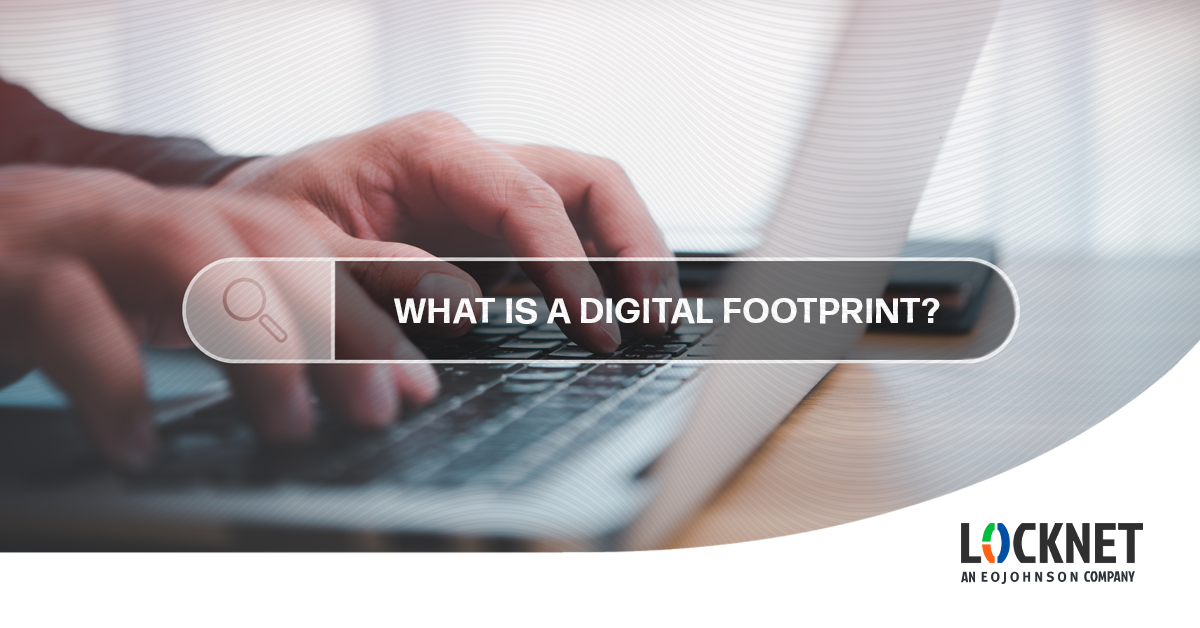World Class IT Support & Service
Real People. Right Now.
About Locknet® IT Services
From the first hello, the Locknet® team is dedicated to serving you and your needs.
Real People. Right Now.
From the first hello, the Locknet® team is dedicated to serving you and your needs.


Updated January 22, 2024
The digital world we live in today is challenging to navigate. From social media profiles to online interactions, every click, post, or comment contributes to the mosaic that is your online presence. And your digital presence has the potential to significantly impact your professional life. Whether applying for a new job, seeking a promotion, joining a community board, or trying to maintain a positive reputation in your industry, it’s crucial to understand the importance of managing your digital footprint and being a good digital citizen.
Your digital footprint is essentially the trail of information you leave behind when you use the internet. This includes social media activity, blog posts, comments on websites, and even email exchanges. It's not just about what you post but also what others post about you. With the rise of social media platforms and online interactions, our digital footprints have become increasingly extensive and visible.
Think of your digital footprint as your virtual resume. Potential employers, clients, or partners often turn to the internet to glean insights into your professional persona before engaging with you. Before a job interview, hiring managers frequently review applicants' online profiles. Similarly, clients research service providers and the people who are calling on them.
We’ll take a closer look at the significance of your digital footprint in three key areas:
Employers often use digital footprint checkers to gain insights into potential hires' online behavior before making hiring decisions. A study by CareerBuilder found that 70% of employers use social media to screen candidates during the hiring process. If your digital footprint reveals unprofessional behavior or content that conflicts with the company's values, it could cost you job opportunities.
Your digital footprint can significantly influence how colleagues, superiors, clients, and competitors perceive you professionally. A well-managed online presence can showcase your expertise and dedication to your field while demonstrating respect for others' views and privacy. A mis-managed digital footprint could impact your ability to move up in the company or close the deal with potential clients.
In some cases, inappropriate online behavior can lead to legal consequences for both employees and employers. For example, sharing confidential company information or making defamatory comments about the company or colleagues could result in legal action.
Crafting a positive digital footprint requires being intentional and mindful in your approach. Here are key strategies to enhance your professional digital presence:
You can use a reliable digital footprint checker to regularly monitor the information available online about you. This will help you address any potentially damaging content before it has an impact on your professional life.
Exercise caution and prudence on social media platforms. Even personal accounts can influence professional perceptions. Regularly review privacy settings and consider the potential impact of your posts. Before posting, consider whether the content could negatively impact your current job, company reputation, or future career opportunities.
Share industry-related insights, thoughtful commentary, or professional achievements through blogs, articles, or contributions on reputable platforms. This showcases expertise and establishes credibility.
Positive reviews and endorsements from colleagues, clients, or supervisors can significantly bolster your professional credibility. Likewise, offering genuine recommendations for others reinforces your reputation as a team player.
Maintaining strong passwords is important for protecting your online identity. Each of your accounts should have a strong and unique password that isn’t shared with anyone. Also, be sure you have the latest security updates on your mobile device. Security education and awareness training from a reputable managed IT service can help your employees understand the importance of maintaining strong cybersecurity measures in both their work and personal lives.
The permanence of your digital footprint was mentioned already, but it’s often overlooked. Once something is online, it's challenging to erase it entirely. Even deleted posts can linger in caches or archives. Therefore, exercising prudence and restraint in online interactions is paramount.
Your digital footprint can also have substantial implications for your employer, extending beyond your personal ramifications. An employee's online presence can directly reflect on the company, impacting its reputation and brand image. For instance, if an employee engages in contentious or unprofessional behavior online, it can inadvertently associate the company with those actions. Similarly, sharing confidential information or negative comments about work, colleagues, or the company itself can tarnish the organization's reputation, potentially affecting client relationships or partnerships.
On the other hand, a positive digital footprint can serve as an asset for an employer. Employees who actively contribute valuable content, engage in meaningful discussions within their industry, and maintain a professional online demeanor can enhance the company's image. They may attract new talent, foster trust with clients, and contribute positively to the overall brand perception. Additionally, a well-crafted digital footprint that showcases expertise and thought leadership can position the company and its employees as industry authorities, opening doors to collaborations, speaking opportunities, or partnerships.
In conclusion, your digital footprint is an indelible mark that shapes your professional identity – impacting both your career and your organization’s reputation. Remember, what you do today online follows you into every job interview, meeting room, and professional interaction. So, make sure your digital footprint is one that enhances rather than hinders your professional opportunities.
Arm your employees with the knowledge to maintain a strong security posture and identify cyber threats, including social engineering, phishing, spoofing, and ransomware. Check out our managed it support for small businesses:
Cybersecurity

Onalaska, WI Waterloo, IA Wausau, WI Eau Claire, WI Burnsville, MN
You are now leaving locknetmanagedit.com. Please check the privacy policy of the site you are visiting.